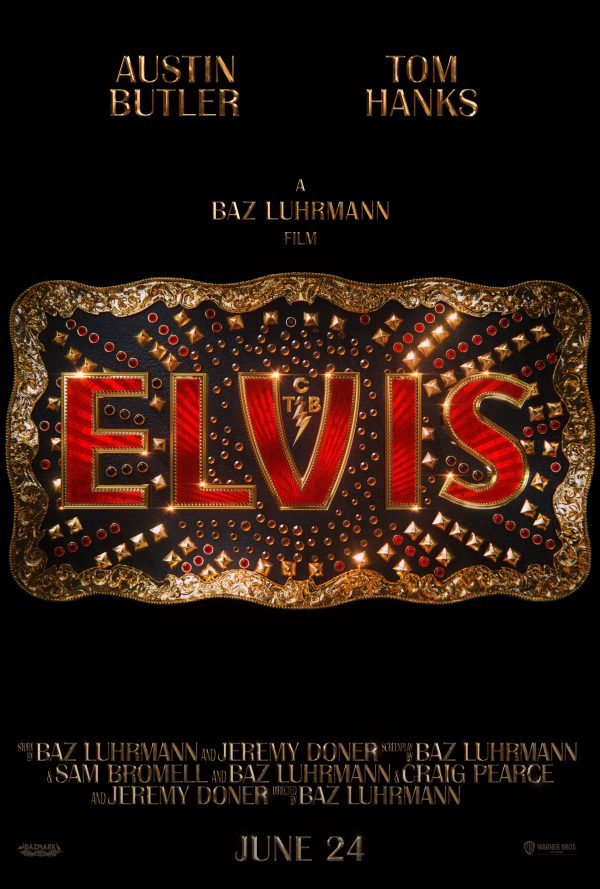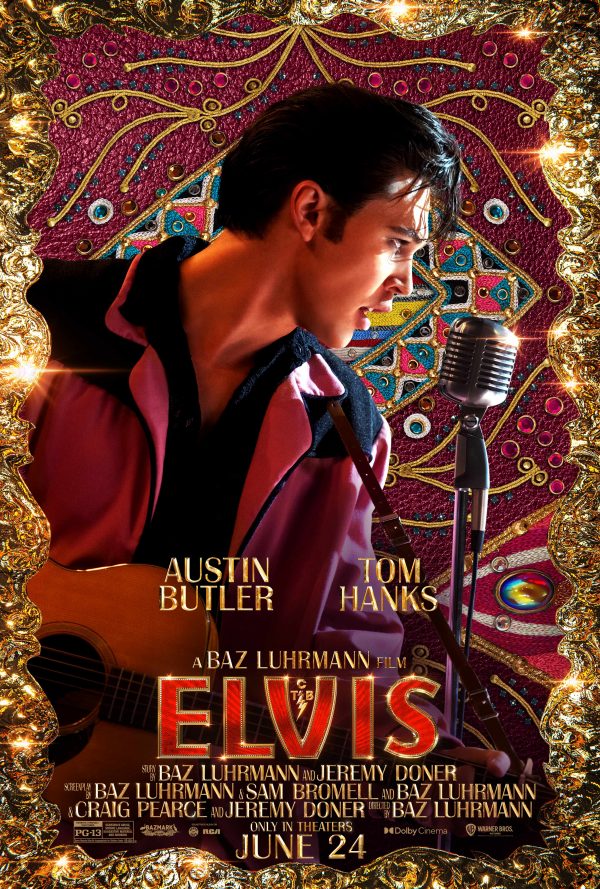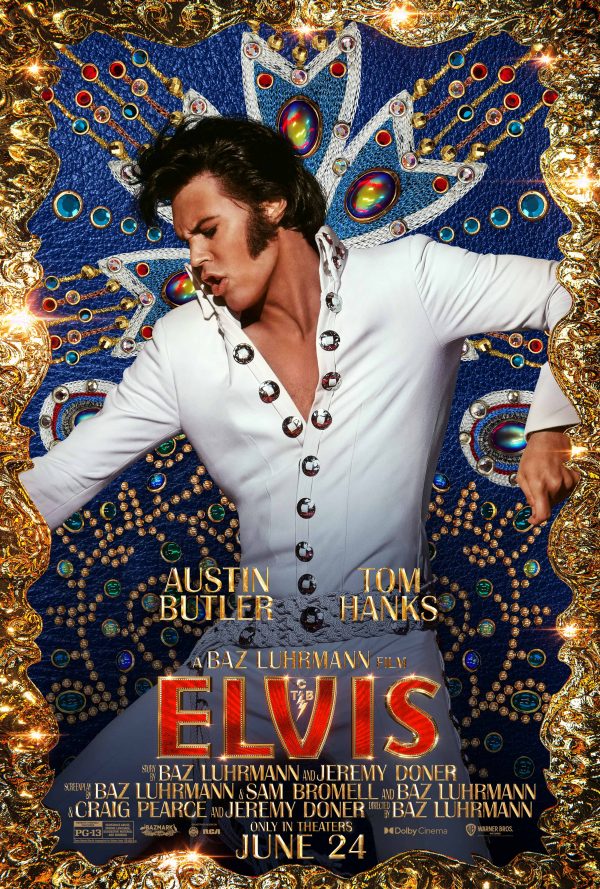
“Elvis” (2022). Cast: Austin Butler, Tom Hanks, Kelvin Harrison Jr., Kodi Smit-McPhee, Olivia DeJonge, Helen Thomson, Richard Roxburgh, David Wenham, Luke Bracey, Dacre Montgomery, Yola, Alton Mason, Shonka Dukureh, Cle Morgan, Nicholas Bell, Chaydon Jay, Tony Nixon. Director: Baz Luhrmann. Screenplay: Baz Luhrmann, Sam Bromell, Craig Pearce and Jeremy Doner. Story: Baz Luhrmann and Jeremy Doner. Web site. Trailer.
Every so often, innovators come along in various fields of endeavor who shake things up and create something unique and inventive, revolutionary conceptions that set their particular milieus of expression on their ear. These creations set new standards for others to emulate or adapt, sometimes even birthing entirely distinct genres different from others that preceded them. In the world of painting, names like Rembrandt and Jackson Pollock come to mind; in writing, icons like William Shakespeare and Ursula K. Le Guin emerge; and in music, the works of Beethoven, Prince and Philip Glass step to the fore. And, when it comes to rock ʼn roll, the king of the genre virtually always springs to mind, the subject of the glitzy new biopic, “Elvis.”
Given how many biographies about Elvis Presley have been made over the years, I had to wonder how much we really needed yet another one. However, director Baz Luhrmann’s new take on the King of Rock ʼn Roll chronicles his story with a highly stylistic approach that hasn’t been as readily apparent in prior productions. Admittedly, the film covers mostly safe territory, presenting Presley’s biography with few new revelations or insights into his life and career. Yet it also places somewhat greater emphasis on certain aspects of the music icon’s life story compared to previous depictions, such as his largely overlooked concerns about social justice issues and his efforts to promote wider awareness of African-American music and artists. In essence, it provides viewers with different degrees of shading and focus that help to distinguish it from earlier efforts.
Interestingly, the film places almost as much attention on the King’s manager, Col. Tom Parker (Tom Hanks), as it does on Presley (Austin Butler). Given how much influence the Colonel had on Presley’s career, it’s hard to separate them. And, from a narrative standpoint, each has a compelling story to tell – Presley with his myriad public personas, from rock ʼn roll bad boy to clean-cut Hollywood film star to larger-than-life Las Vegas stage performer, and the enigmatic Parker with his secretive past, shifty, self-serving manner of dealing, and blustery carnival barker style of management. In some ways, this is as much Parker’s story as it is Presley’s.
The picture’s story line takes a rather rote, highly familiar approach to Presley’s life. Beginning with his challenged childhood in Tupelo, MS, we see a young Presley (Chaydon Jay) growing up in a household largely managed by his mother, Gladys (Helen Thomson), while his father, Vernon (Richard Roxburgh), serves jail time for writing a bad check. Limited income forces mother and son to live in low-income housing in an area predominantly populated by impoverished African-American residents. But that experience exposes young Elvis to the music of his neighborhood peers, something to which he takes an instant liking – and plants the seeds of his future.

Upon relocating to Memphis, TN, at age 13, Elvis continues to develop his interest in music. In the early 1950s, he begins hanging out at nightclubs on the city’s legendary Beale Street strip, where he befriends some of the major African-American musicians of the day, such as B.B. King (Kelvin Harrison Jr.), Little Richard (Alton Mason) and Big Mama Thornton (Shonka Dukureh). Their influence rubs off on him significantly, and that’s reflected in his early recordings, which receive considerable regional radio airplay. His songs soon catch the attention of country musician Jimmie Rodgers Snow (Kodi Smit-McPhee), son of country music legend Hank Snow (David Wenham). The younger Snow, who at the time is touring with his father’s road show, alerts his dad’s manager to the sound of the rising new talent. And that manager, who’s looking to add artists to the road show’s roster of performers, just happens to be Col. Parker.
Before long, Elvis is on the Hank Snow show lineup, quickly rising through the ranks to become the most popular performer on the show card. But Snow is unhappy with Presley’s “lewd” on-stage performances; the youngster’s wildly gyrating hip movements offend his older, more conservative colleague and end up earning him the cheesy, disparaging nickname “Elvis the Pelvis.” Granted, his provocative stage presence develops a reputation for working up crowds into a frenzy (especially among the women, some of whom scream and toss their underwear onto the stage), but Parker does little to restrain his client’s behavior, clearly realizing that’s what sells tickets.
At that point, Snow and Presley part ways, enabling Elvis to become his own headliner. He also manages to land appearances on TV variety shows hosted by the likes of Milton Berle and Steve Allen. However, despite this popularity, his on-stage antics impede him in getting booked to some gigs that hold the promise of greater exposure. It even captures the attention of officials like Sen. James Eastland (D-MS) (Nicholas Bell), who seek to bar this so-called obscene musical menace from the airwaves.
When an altercation erupts at one of Presley’s concert performances, at the advice of Parker, the singer attempts to deflect attention away from the controversy by fulfilling his military service obligation. The move is designed to repackage the rebellious youth as a clean-cut young man, a more mature version of Elvis who it was believed would be more palatable to mainstream American audiences. Revamping his image is also a step to prepare him for a career as a Hollywood actor, one of Presley’s long-cherished dreams. But things don’t quite work out as hoped for on that front; while longing for substantial dramatic roles, he is primarily cast in innocuous romantic comedies that afford him opportunities to sing as well as act. Those lightweight vehicles are largely panned by critics, despite most of them being box office money-makers, at least at first.
As the 1960s unfold, however, circumstances begin to change for Elvis personally, professionally and culturally, and he experiences his share of heartache and disappointment. His mother’s death at age 46 is a crushing blow. The arrival of the British Invasion, headlined by the Beatles, heralds a change in tastes of popular music. The sociopolitical climate of the country becomes increasingly troubling with the assassinations of Rev. Dr. Martin Luther King Jr. and Sen. Robert Kennedy (D-NY), events that affected Elvis deeply. And, as the decade wears on, interest wanes for Presley’s increasingly silly movie projects. True, there are happy moments, such as the King’s marriage to his loving wife, Priscilla (Olivia DeJonge), but Elvis is desperately in need of reinventing himself.

Presley has many ideas for new projects, most notably overseas tours, but, every time he discusses them with Parker, the Colonel steers his client in new directions. Instead, he proposes such prospects as a television special and performing at the opening of the Las Vegas International Hotel, a venue featuring the largest concert stage in the city. Though initially reluctant to pursue these possibilities, once properly sweet-talked by his silver-tongued manager, Presley agrees to both projects.
Presley’s 1968 comeback TV broadcast proves to be a huge hit, putting his name back on the entertainment map. It’s a triumph that introduces him to director/co-producer Steve Binder (Dacre Montgomery) and talent manager Jerry Schilling (Luke Bracey). Impressed with what they were able to do for him, Elvis begins aligning himself with them more closely, as he begins to realize that Parker may not have his best interests at heart. Those suspicions prove correct when Elvis discovers that Parker is secretly railroading him into commitments that he hadn’t formally agreed to, such as an extended performance schedule at the International in lieu of a promise of an overseas tour schedule. He also discovers evidence that Parker has been fleecing him, at times taking up to 50% of the revenues from certain projects.
As all this unfolds, Presley begins experiencing his share of personal problems. His marriage has hit the skids after the revelation of a series of less-than-discreet affairs. Also, given his ambitious work schedule, Presley becomes dependent on prescription medications, an addiction that exacerbates his rapidly failing health and a noticeable (and frequently lampooned) weight gain. And, as the situation deteriorates, his performances suffer. The onetime innovator who managed to make quite a name for himself and become the best-selling rock ʼn roll artist of all time is in serious decline, and not even his remarkable ability to bounce back and reinvent himself appears to be enough to pull him out of this accelerating downfall.
We should all be grateful for the innovators in our lives. The impact they have on our culture is often tremendous, and, sooner or later, that influence frequently trickles down to us as individuals, shaping us in various ways. This could be by way of imitation or, perhaps more importantly, by way of inspiring us to become innovators in our own right, either in the same field of those who influenced us or in other unrelated but nevertheless significant ways. And that’s something we can thank Elvis for, even if he didn’t realize he was having that kind of impact.
So how do they do this? It’s because they believe they can realize their dreams, either overtly or subconsciously. Presley accomplished so much simply as a result of invoking these intangible forces, the building blocks of the conscious creation process, the philosophy that maintains we manifest the reality we experience through the power of our thoughts, beliefs and intents. He may not have been familiar with this particular school of thought, but, considering what he achieved, he was certainly a master of its principles. And, in doing so, he passed along so much to so many others in so many ways.
What’s particularly intriguing about what Elvis accomplished is that he made it look so easy. He always seemed to fall into what he was doing and make it work without needless exertion or Herculean effort. In large part that’s because, on some level deep down inside, he knew what he was doing and believed that he could make it happen. What’s more, he also believed that he could transform himself, reinventing himself when the need arose, as the various phases of his career illustrate. That shows an adeptness to change – and being open to the idea when the need arose – no matter how many fears, limitations or obstacles may arise in connection with such endeavors. Now that’s innovation at work.

To a great degree, this comes about as a result of recognizing where the point of power lies – in the present moment. Elvis always seemed to have a knack for being in the now and drawing from the only point of power over which we have any genuine control. This is not to say that he (or we) didn’t look at the future or the past, but he understood that the present was where the true power resides and successfully made use of it, creating a myriad of moments that we all remember and associate with his ability to innovate.
Of course, this also raises the question, if Elvis was so inventive, why did he succumb to the manipulation of the Colonel and subsequently suffer such an early demise? This, too, has to do with the management of one’s personal power, which, in the case of Presley’s relations with his manager, came down to surrendering too much of it. While Elvis may have been an innovator in terms of his creativity, he was less adept at the management part of the equation and relied on Parker to handle such matters for him. Presley’s belief in the Colonel drove that decision, even if it wasn’t the wisest course where his best interests were at heart. Moreover, once this decision began to influence Presley’s creative choices, such as where his career was headed and what types of projects he wanted to tackle, the foundation of that career began to suffer. If Elvis had had more conviction in his own beliefs in this regard, there’s no telling where circumstances may have taken him. Less stress, less over-exertion in his workload and more satisfaction from fulfilling his own aspirations could well have better suited and sustained him, resulting in fewer deleterious effects on his health and well-being. Unfortunately, we’ll never know for sure, but at least we can enjoy – and be thankful – for what he left us and the impact he had on our art, culture and society. Long live the King.
This latest installment in the Elvis legacy is a solid, reverential, if a bit uneven, offering about the King of Rock ʼn Roll. True to the filmmaker’s characteristic glitzy, high-gloss cinematic style, “Elvis” is decidedly cut from the same cloth as earlier works like “Strictly Ballroom” (1992) and the remake of “The Great Gatsby” (2013), featuring stunning (if at times somewhat overdone) visuals and production values. As for the narrative treatment in this release, the balance between the dual plot threads involving Presley and Parker isn’t always balanced as well as it might have been, and some aspects of Presley’s life are given noticeably short shrift, such as his loving but often-stormy marriage to Priscilla and his struggles with substance abuse. Nevertheless, for a film with a 2:40:00 runtime, it’s remarkably well paced (save for a little sagging in the middle) and never loses viewer attention, thanks in large part to its energetic and vivid visuals. The real standout here, though, is the fine breakout, award-worthy performance of Austin Butler in the lead role, who imbues his take on the character with respectful credibility and successfully avoids making this well-known persona look like a caricature of himself, something that would be easy to do in lesser hands. This release may not be the silver screen epic it aspires to be, but it’s a fine way to spend a weekend afternoon at the theater, one that’s certainly better than much of what this year’s summer movie season has produced thus far.
In a world in need of innovation to address its challenges and provide it with artistic fulfillment, we need more of us to step up and implement this concept to address these issues. Elvis may not have been the one to tackle some of these questions, but his inventive creative spirit – and his willingness to act on it – provides us with a template to draw from in these kinds of endeavors. To some, that may seem like a stretch; to others, that might be exactly the kind of platform that needs to slip into place. No matter how we view it, though, we should appreciate what such an innovative outlook can do for us, whether we’re looking to save the planet or simply come up with some toe-tapping tunes. In either of these undertakings, there’s one common rallying cry we should implement in connection with them both: Rock on!
Copyright © 2022, by Brent Marchant. All rights reserved.

No comments:
Post a Comment